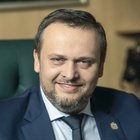Andrei Nikitin reported that the military-industrial complex in the region has expanded by nearly 160 percent in recent years. However, there is a notable shortage of personnel, and there is a need to rejuvenate the workforce in this sector. To address this, funding has been allocated in collaboration with the Ministry of Education under the Professionality programme, aiming to meet the demand for young professionals over the next 2.5 years. Renovations are underway for college buildings, and new equipment is being bought. Additionally, civilian enterprises are contributing to the objectives of the special military operation.
Industrial production has grown by 116 percent, indicating positive results across all sectors.
The governor mentioned the President’s instruction for a pilot project focused on long-term care for the sick. Early results show a nearly 40 percent reduction in hospitalisations and a 30 percent decrease in ambulance calls. Additionally, nearly 1,600 care assistants have been recruited, and about 1,000 individuals who were previously out of the workforce due to caregiving responsibilities are now employed in the economy.
In response to the President’s comment about the shortage of narrow specialists in the regional healthcare system, Andrei Nikitin noted that efforts have been made to halt the decline and begin increasing the number of medical professionals in the region, notably through the provision of housing. Over the past three years, the number of doctors has risen by about 10 percent, although, as the governor pointed out, this is still insufficient.
The new pilot project aims to boost the birth rate and involves three small towns: Borovichi, Valdai, and Staraya Russa. These towns are transforming their urban environments, including new housing construction for the first time since the Soviet era. Initial signs of growth have been observed, and efforts will continue with maximum intensity.
The Governor highlighted the increase in real incomes as a key economic indicator, noting that poverty in the region has historically been higher than the national average. Addressing this issue is crucial, and there is a clear plan in place to reduce it.
The development of a special economic zone is progressing, with the first three residents already established. Next year, the GigaFactory will join, focusing on the assembly of TVs and smart speakers.
The discussion also covered various topics, including school renovations, connecting neighbourhoods to the gas distribution network, the operations of cultural institutions, and improvements to the water supply. Additionally, several key projects were addressed, such as the development of a perinatal centre, a veterans’ home, and the restoration of historical architectural monuments in Yaroslav’s Court.
The governor also announced that next year will see the reconstruction of the theatre building, and restoration work has already commenced on the Church of Peter and Paul on Sinichya Gora, a unique monument from the late 12th century. In 2025, the second building of the Innovative Scientific and Technological Centre Intellectual Electronics – Valdai will be constructed. This facility will serve as a collaborative platform for students, young scientists, industrial partners, and technology business representatives. Additionally, construction of the national archaeological centre will start this year, and work on the cardiology centre is set to begin in 2026.
Andrei Nikitin also addressed the challenging issue of landscaping the area around the Novgorod Kremlin, known as Kremlin Park. He expressed gratitude to the President for initiating a dedicated programme for the reconstruction of parks and city centres and said that Novgorod would take full advantage of this opportunity.
Vladimir Putin stressed the importance of this project, stating that both the Kremlin and its surrounding areas must be maintained to a high standard.




